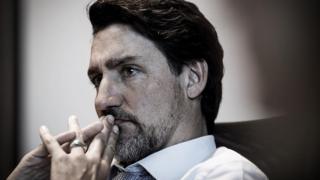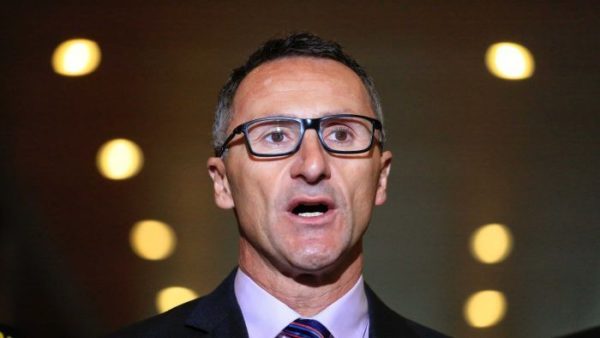 Image copyright Courtesy Adam Scotti Instagram
Image copyright Courtesy Adam Scotti InstagramCanadian prime minister Justin Trudeau has returned from his winter holidays with a fresh beard. After a photo of the prime minister was released by his official photographer, he joined a growing list of politicians whose facial hair has sparked fascination.
In the image released of Mr Trudeau, he stares seriously into the middle distance, showing off a jaw line and chin covered with salt-and-pepper hair.
It is not the first time the Canadian politician has accessorised with a set of whiskers.
Before he became the Liberal leader and prime minister, he grew a memorable moustache and goatee combo for the Movember prostate cancer charity.
Facial hair is a look rare enough in modern politics that people take notice when a political leader decides to grow a beard.
In some parts of the world, facial hair can signify a lot more than personal style. The politics around beards have been fraught in Egypt in recent years – in a nation with long-standing, secular traditions, beards have been viewed as a symbol of Islamist hardliners.
In the US, beards have been perceived as a political turn-off for voters for decades and the refuge of the defeated candidate.
Former US presidential candidate Al Gore made headlines after he re-emerged in 2001 from his bitter election defeat with a full beard. Dubbed an “exile beard”, it was subject to intense analysis.
Now they seem to be having a moment.
When former US House Speaker Paul Ryan unveiled fresh stubble on Instagram in 2015, he noted that he was the first speaker to have a beard in almost 100 years, and his decision to abandon his clean-shaven look caused a stir.
Only about 5% of the members of the US Congress had beards or moustaches at the time, according to research from Oklahoma State University political science professor Rebekah Herrick.
Republican US Senator Ted Cruz’s beard, which made its first appearance in 2018, fascinated the internet for weeks.
India’s Prime Minister Narendra Modi is known for his distinctive white beard, and the country’s media took note when 18 of his 58 ministers inaugurated into his new Cabinet last summer had beards.
In the UK, when Margaret Thatcher was prime minister, her dislike of facial hair led to accusations of “pogonophobia” – defined as an extreme dislike of beards.
But more recently, the outgoing Labour leader Jeremy Corbyn was the first bearded man to head a British political party since 1908.
In Canada, the last three leaders of the country’s left-leaning federal New Democrats have had facial hair, including current leader Jagmeet Singh, an observant Sikh who wears both a turban and a beard as part of his faith.
Still, Mr Singh’s predecessor, Thomas Mulcair, faced calls to shave his trademark full beard when he took over the party’s leadership, as reported by the Globe and Mail.
The last Canadian prime minister to wear facial hair was the moustachioed Sir Robert Borden, in the early 20th Century.
It is not clear if Mr Trudeau’s beard will become a permanent fixture or if he will shave before MPs return to Ottawa in late January.
Temporary or not, the post-holiday beard “is more of a mature look, especially with the gray coming through,” Lynne Mackay, with consulting firm Mackay Byrne Group, told the BBC.
“It’s an established look,” said the image consultant who has worked with numerous Canadian politicians, though not Mr Trudeau.
“There is a certain level of maturity that he’s projecting with this beard, there’s no doubt about it.”
The 48-year-old prime minister first came to power in 2015 as a fresh face in Canadian federal politics and on the world stage.
Always an image conscious politician, the photo of the bearded Mr Trudeau released by his team contrasts his youthful political brand.
Following a series of political crises and scandals, he faced a recent tough re-election battle that saw him retain power but fall short of a majority seat count in the House of Commons.
“He doesn’t look so young with this [beard],” said Ms Mackay. “He certainly does look more of a seasoned statesman.”
- A history of beards in the workplace
- Decoding facial hair in the Arab world
- Egypt’s new symbol of power?
She noted that facial hair is something that falls in and out of vogue and has seen a revival in recent years.
As a consultant in the business world in the 1980s, she said the clean-shaven look was seen to project openness and integrity.
“Things have come so far since that time,” she said. “Beards are very acceptable in business so I think it’s a natural transition to see it move into politics.”
It is also one of the few ways for men to express themselves with their style “and show a little bit of individualism”, she said.
